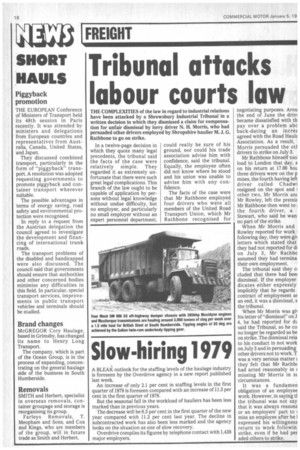Tribunal attacks labour courts law
Page 20

If you've noticed an error in this article please click here to report it so we can fix it.
THE COMPLEXITIES of the law in regard to industrial relations have been attacked by a Shrewsbury Industrial Tribunal in a written decision in which they dismissed a claim for compensation for unfair dismissal by lorry driver N. H. Morris, who had persuaded other drivers employed by Shropshire haulier M. J. G. Rathbone to go on strike.
In a twelve-page decision in which they quote many legal precedents, the tribunal said the facts of the case were relatively simple. They regarded it as extremely unfortunate that there were such great legal complications. This branch of the law ought to be capable of application by persons without legal knowledge without undue difficulty, but no employer, and particularly no small employer without an expert personnel department, could really be sure of his ground, nor could his trade association advise him with confidence, said the tribunal. Equally, the employee often did not know where he stood and his union was unable to advise him with any confidence.
The facts of the case were that Mr Rathbone employed four drivers who were all members of the United Road Transport Union, which Mr Rathbone recognised for negotiating purposes. Arou the end of June the drivl became dissatisfied with th pay over a problem abc back-dating an increa agreed with the Road Hauls Association. As a result, Morris persuaded the ot1 drivers to strike on July 3.
Mr Rathbone himself tool load to London that day, a on his return at 17.00 hot three drivers were on the p mises, the fourth having left driver called Chadwi resigned on the spot and 1 other two, Mr Morris an Mr Rowley, left the premis Mr Rathbone then went to the fourth driver, a Stewart, who said he want no part of the strike.
When Mr Morris and Rowley reported for work I following day, they were gi \ letters which stated that they had not reported for di on July 3, Mr Rathbc assumed they had termina their own employment.
The tribunal said they ci eluded that there had beei dismissal. If the employer dicates either expressly implicitly that he regards contract of employment as an end, it was a dismissal, s the tribunal.
When Mr Morris was gi his letter of "dismissal" on J 4, he had reported for di.. said the Tribunal, so he co no longer be regarded as be on strike. The dismissal rela to his conduct in not work on July 3 and in persuading other drivers not to work. T was a very serious matter they felt that Mr Rathbc had acted reasonably in ( missing Mr Morris in st circumstances.
It was a fundamen obligation of an employee work. However, in saying tit the tribunal was not say that it was always reasons or an employers' part to miss an employee after he I expressed his willingness return to work followin: strike, even if he had per aded others to strike.




















































































